The Maze Escape: the biggest jailbreak in UK history
- Published
IRA inmates escaped from the prison
Thirty-four years ago, a team of IRA inmates escaped from what was supposed to be the most secure prison in Europe. It was, and remains, the biggest jailbreak in UK history.
Despite being on the wrong side of 60, Brendan Mead is still a physically intimidating man. Shaven headed, lean and muscular, he has the air of someone who has known violence up close and personally.
He was chosen as the "tip of the spear" for one of the most dramatic operations in Northern Ireland's decades of violence.
He struck the first blow to start the 1983 breakout from the Maze Prison.
Thirty-eight hardened paramilitaries used smuggled guns and knives to take over their block before escaping across the crop-filled fields surrounding the jail, some 12 miles from Belfast.
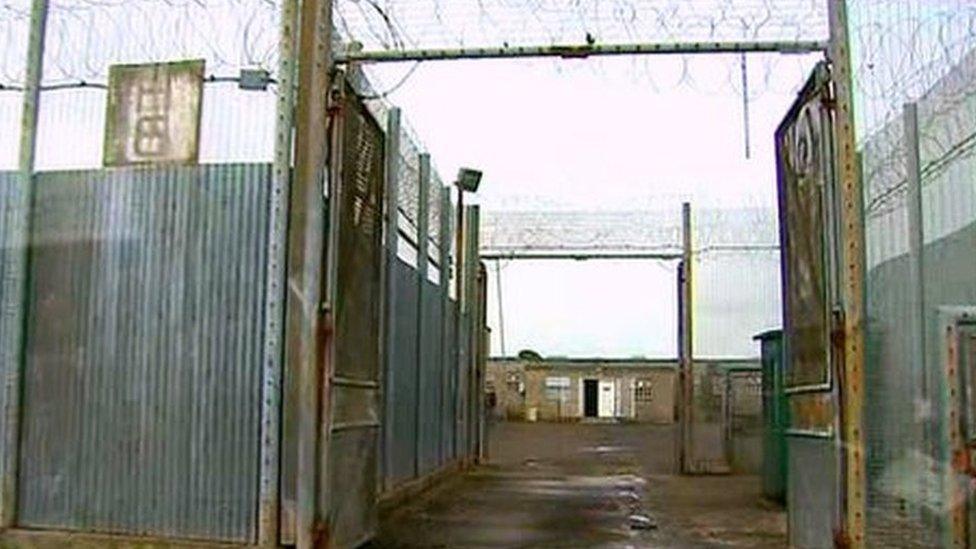
The entrance to H-6 inside the former maximum security prison
Republicans, with a sense of pride, hold it up as their Great Escape; Unionists recall how one prison officer was killed and others were so seriously injured or traumatised that their lives were effectively ruined.
With its warders backed up by armed soldiers and its distinctively-shaped 'H' blocks, purpose built to house Northern Ireland's feared paramilitaries, HMP Maze became an instantly recognisable feature on the violent landscape of the Troubles.
It stood as another reminder of how things in Northern Ireland were not the same as in the rest of the UK.
Prison officer James Ferris died of a heart attack after being stabbed while attempting to stop the breakout.
Sixteen escapees were later acquitted of his murder after the trial failed to prove the heart attack was caused by the stabbing.
Archive: BBC's Austin Hunter reporting on the escape
Brendan Mead is now a born-again Christian. A key organiser of the biggest prison breakout in UK history, he has spoken for the first time about what remains one of the most dramatic moments in the history of the Northern Ireland Troubles.
Mead reveals:
A second escape was planned, this time involving a gun battle, from the Crumlin Road jail in Belfast
The Maze escape faltered as IRA prisoners searched for details of informers
Details of the shooting of a prison officer moments after a confrontation with future Sinn Féin MLA Gerry Kelly
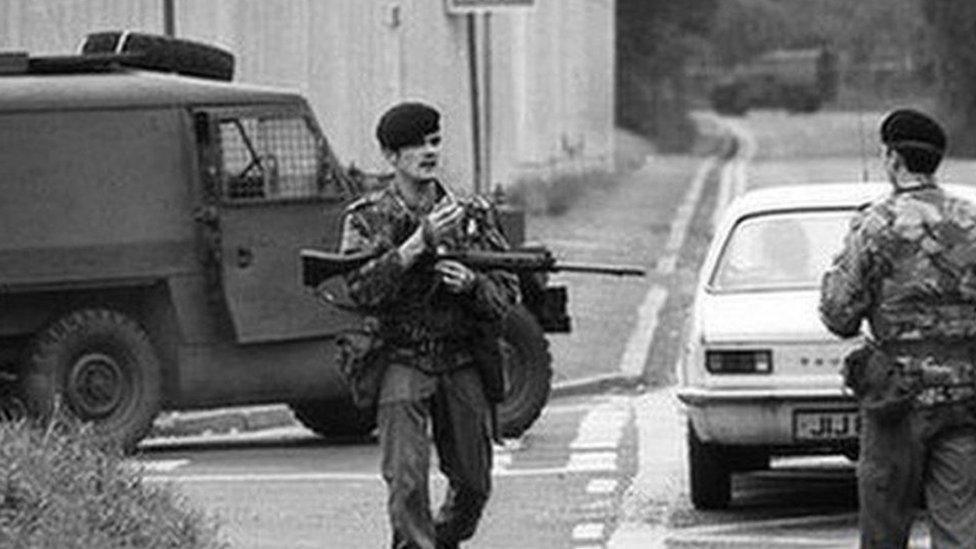
A huge security operation was launched after the escape
Mead was chosen to be the first prisoner to overpower a guard. This was because he was regarded by his fellow inmates as "the fittest man in H7".
This is the first time in 34 years that Mead has spoken on the record about his role in the events.
He revealed that the getaway vehicle used in the Maze breakout, a food delivery lorry, was delayed because IRA "intelligence officers" were rifling through drawers and boxes of papers after taking control of the wing.
Brendan Mead speaks for the first time about his role in the 1983 Maze Escape
"The IRA volunteers, particularly the IOs [information officers] preferred to find out who had been an informer or who was working for the prison staff, or who was working for whomever.
"They needed to get that documentation, but they became more focused on that, going through the information trying to find out if there were informers in the ranks."
Mead says that five-minute delay caused problems for the escapees as their vehicle was still in the yard when prison officers began arriving for the next shift.
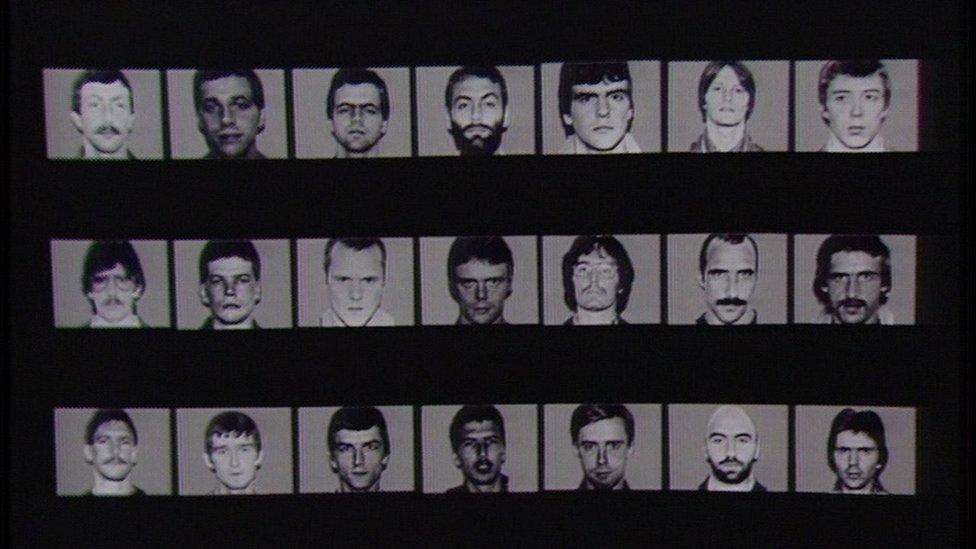
Some of the Maze escapees
He revealed, for the first time, details of a 'sister' escape plan which targeted the Crumlin Road jail.
It was to have been put into operation after any Maze escape prisoners, who had been recaptured, had been sent there ahead of a trial.
Brendan Mead said: "It was already set up. This is the escape trial we're talking about. Everything we needed was packed into the mortar tubes and they were to be shot over at an exact time when we were in 'A' wing yard.
Brendan Mead says a second jail escape was planned
"We were to open the mortar tubes, take out the equipment, and then breach the Crumlin Road as well.
"But that didn't happen because, the people who were on the mortar tubes, they were caught inside a garage at the back of the prison from where they were going to shoot them over. "
Mead accepts that "people's lives were destroyed by what happened" on the day of the Maze escape.
People like John Adams, the prison officer shot in the head during the jailbreak.
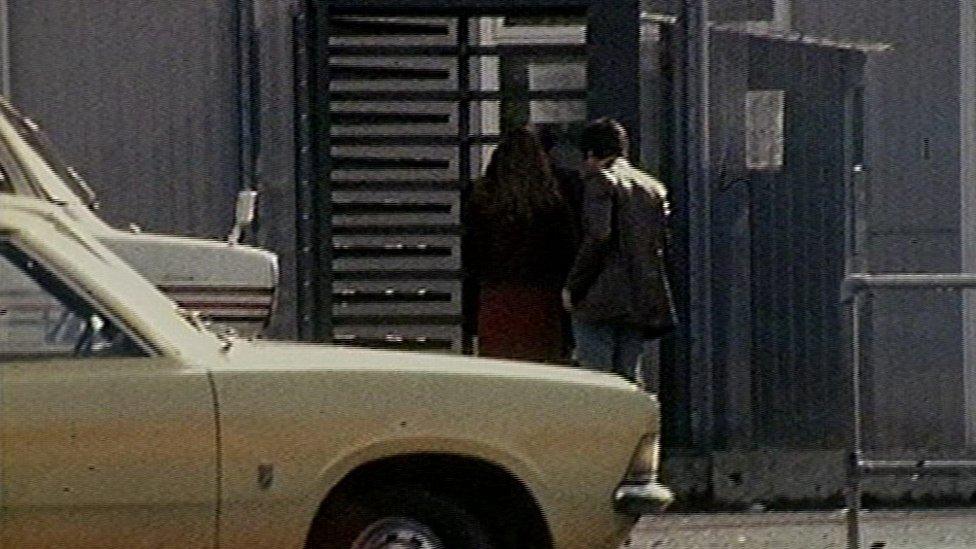
Visitors arriving at the Maze Prison in the 1980s
BBC News NI has obtained documents from the Public Records Office of Northern Ireland (PRONI) relating to the subsequent trial of two leading escapees, Brendan 'Bic' McFarlane and Gerry Kelly.
They offer a fascinating insight into what went on in the Maze that day.
Among those documents, John Adams' account of what happened.
In his statement Mr Adams claims Gerry Kelly shot him in the control room. It reads:
Prison officer John Adams' statement to the trial of two Maze escapees
"At 2:20 PM prisoner 58, Kelly, appeared at the grille with a gun pointed at me. He told me not to touch any of the controls or warnings.
"He then told me to open the gate which I did do. He said, "I have nothing to lose; you know what I'm in for."
"He then told me to lie down on the ground, put my hands behind my head. This was inside the control room.
"Kelly was distracted by something and turned away from me. I jumped up and slammed the door and tried to lock it, but it was forced open.
"Kelly then came back into the control room and fired two shots. The first one missed me and the second hit me above the left eye, entering my head. I collapsed to the floor."
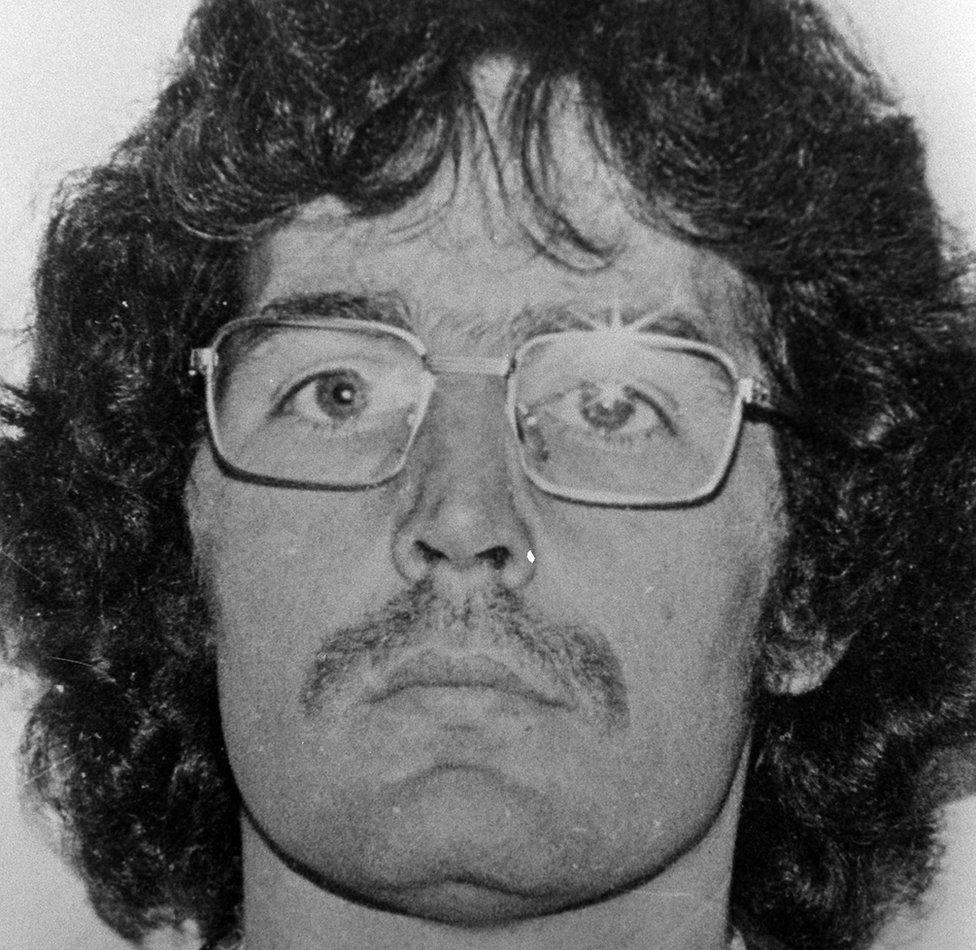
Gerry Kelly had been jailed for life in 1973 - after the Maze Escape he was eventually captured in Holland
In a conversation with BBC News NI in 2013, Mr Adams repeated the version of events outlined in his original statement, once again naming the Sinn Féin man as his attacker.
Gerry Kelly has never admitted shooting Mr Adams and was found not guilty after his trial in 1987.
In his own book about the escape, Kelly refers to the person who shot John Adams only as 'the prisoner.'
Some years after the shooting, John Adams was convicted of sexually assaulting a young girl. Mr Adams died on August 16 last year.
'No one was to be hurt,' says Brendan Mead
He was buried on August 31, the arrangements having been made by the hospital in which he died. His grave is as yet unmarked.
Brendan Mead maintains that, while he was nearby, he didn't see the actual shooting incident.
Addressing any allegations that still exist, is, he insists, something that only Gerry Kelly can do.
"John Adams said it was Gerry Kelly who shot him. If that's where Gerry was, then that's his thing. He's to address that, not me.
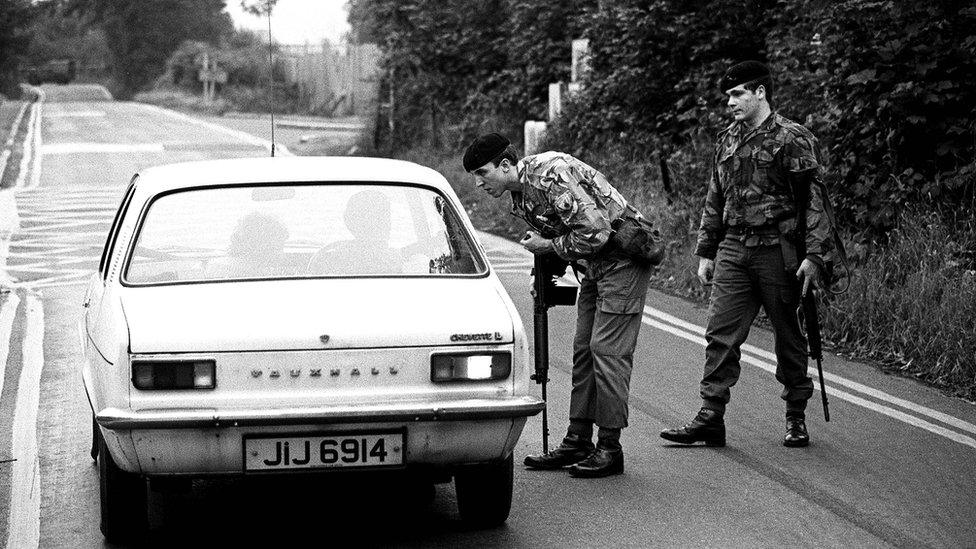
Army at the scene of the Maze escape
"Apparently Gerry was at the control room and, whatever happened between him and John, the shots then went off."
Other documents in the bundle released by PRONI include a handwritten note which was to be read to IRA members who were chosen to take part in the escape.
It suggests that the IRA leadership feared the rank and file members would not go along with the plan. It makes it clear that any prisoners told to join the escape would have no option but to go along with it.
A note to be read to IRA members who were chosen to take part in the breakout
It reads as follows:
"To all POWs (Prisoners of War) chosen by camp staff to go on escape.
"Very few of you are aware of what is now taking place. This is due to security and the possible refusal of some of you to go on this escape. Since it is the duty of all POWs to escape I now instruct you to go to this yard to board the feed lorry. Regardless of your feelings we are taking you with us, we have no time for arguments. Just do as instructed. Any refusals will be met with force."
Another note was apparently intended for prison staff taken hostage:
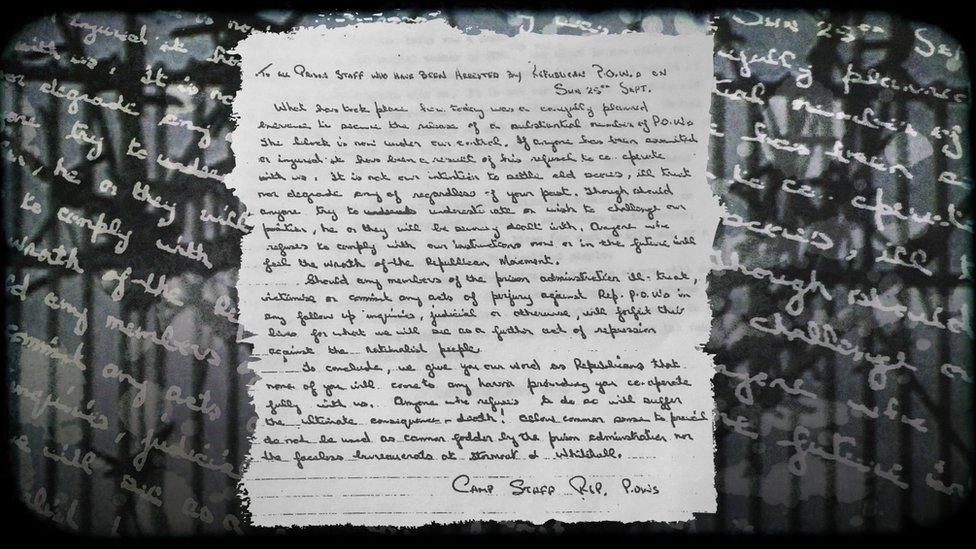
Among the papers held at the Public Records Office is a note apparently intended for prison staff taken hostage
"To all prison staff who have been arrested by Republican POWs on Sunday, September 25.
"What has taken place here today was a carefully planned exercise to secure the release of a substantial number of POWs. The block is now under our control.
Jailbreak delayed as 'IRA tried to find out if there were informers'
"If anyone has been assaulted or injured, this has been a result of his refusal to cooperate with us. It is not our intention to settle old scores, ill-treat nor degrade any of you regardless of your past. Though should anyone try to underestimate or wish to challenge our position, he or they will be dealt with severely.
"Anyone who refuses to comply with our instructions now or in the future will feel the wrath of the Republican movement. Should any members of the prison administration ill-treat, victimise or commit any acts of perjury against Republican POWs in any follow-up enquiries, judicial or otherwise, they will forfeit their lives for what we will see as a further act of repression against the nationalist people.
A note from IRA members to prison staff taken hostage
"To conclude, we give you our word as Republicans that none of you will come to any harm providing you cooperate fully with us.
"Anyone who refuses to do so will suffer the ultimate consequence - death!
"Let common sense prevail, do not be used as cannon fodder by the prison administration nor the faceless bureaucrats at Stormont and Whitehall."
A film about the escape, entitled simply Maze, goes on general release today. As with all interpretation of our past, whether through drama or documentary, controversy seems inevitable.
Asked if it was too soon for a movie about the escape, Mead said he worried that the film makers would glorify it to some extent, but that for him it was just history. "What do I think about the escape? I don't really think anything of the escape," he said.
Will he go and see the film?
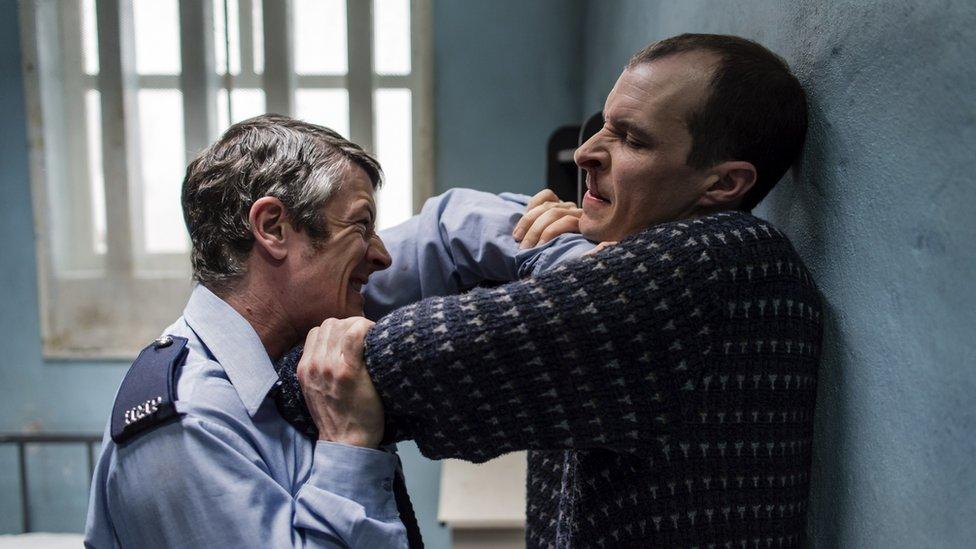
The premiere of the new film MAZE took place in Belfast
"It would be hard to match the reality," he said. "I don't even know if I would watch it, it's not something that drives me. That's not my life anymore.
"It's part of my past. It's something that I participated in. I don't try to glorify that past; it's a reality and I have to acknowledge that I was a full, consenting, participant in it all.
"It's not like I'm saying: 'Oh look at me, look at what we done'. I could have played for Manchester United. That's part of my history that didn't happen.
"I believed in my mindset at that time that it was a necessary thing to do. There was only one negative thing about it and that's that some people were badly injured and their lives were destroyed by it."
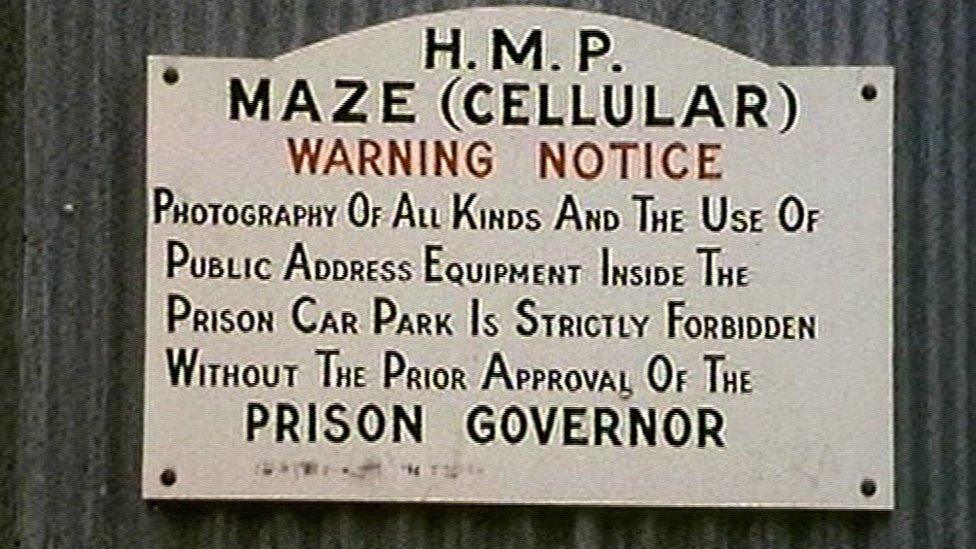
Lives were destroyed by the events of that day; that is not in dispute.
Thirty-four years may have passed but it's clear that many of the officers taken hostage, hooded and terrorised, are still struggling to come to terms with what they experienced.
BBC News NI approached several officers who were working in the Maze at, or around, the time of the breakout.
Only one agreed to an interview. As the time to meet neared, though, the now-retired officer pulled out.
The enforced reflection had been just too much for him. "The trauma is incredible," he explained.
None of his colleagues felt willing or able to contribute to this article.
- Published22 September 2017
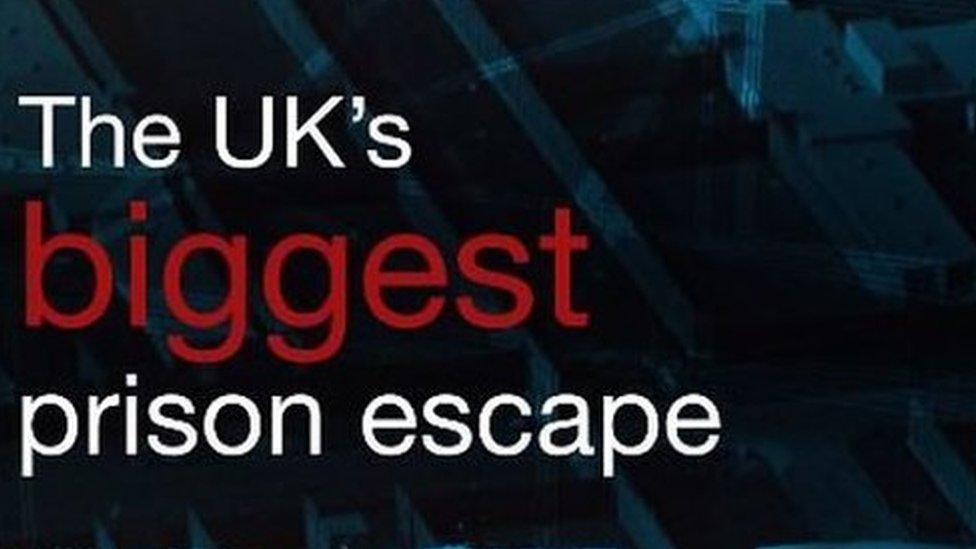
- Published27 December 2013
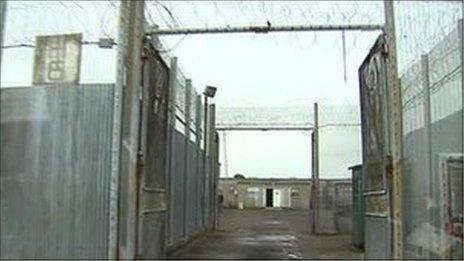
- Published1 August 2013
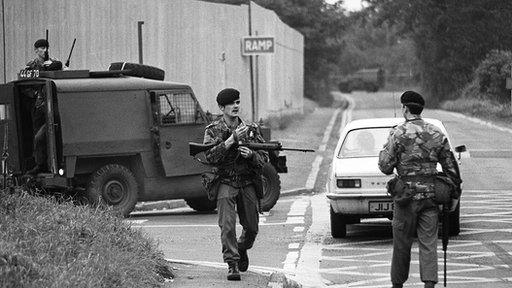
- Published27 December 2013
